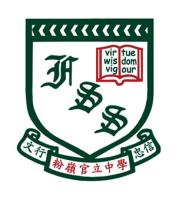| Language Policy |
Chinese is used as the main medium of instruction from Secondary 1 to 6. |
| Learning and Teaching Strategies |
The school sets different levels of goals for students to strengthen their self-confidence. In addition to the summative and ongoing assessments, students' work, classroom performance and learning attitudes are also assessed and considered as part of their academic performance. Small class teaching has been adopted in English Language and Mathematics lessons. In junior forms, a tailor-made curriculum has been adopted. In order to raise the teaching level, the school promotes class research and collaborative activities. The Academic Affairs Team is familiar with the new direction of curriculum development, formulates different learning strategies and regularly organizes cross-curricular learning activities to cultivate students' self-directed learning and generic skills.<br> |
| School-based curriculum |
1. Electives: 2X. Providing 6 electives per group and 2 groups in total for students to choose from.<br> 2. Curriculum highlights: In line with the development of education and its trend, the school takes into account the needs, interests and abilities of students, and formulates a junior-form school-based curriculum to enable students to master the basic knowledge of different learning areas. For the senior-form curriculum, in addition to the four core subjects, twelve elective subjects are also provided for students to choose from. "Other Learning Experience" lessons are incorporated into the regular timetable. This complements the core and elective subjects and by which cater for the needs of students in their learning and growth. To optimize the four core subjects is not only to create space and free up more class time for students to develop their potential, but also to take care of their diversity. To achieve a balanced development, students make use of the free time to study amongst the extended part of Mathematics (M2), Applied Learning Courses and Life-wide Learning Courses. The school has a RaC period to enhance Form 4 students' interest in reading and help them build knowledge in different learning areas and levels. In order to enhance the effectiveness of learning and teaching and cater for students’ needs, the school adopts different strategies, such as using tailored curriculum, cooperative learning, tiered assignments and e-learning.<br> |
| Approach to Catering for Learner Diversity |
The Secondary 1 Mentor Scheme: All non-class teachers (including Principal and Assistant Principals) serve as mentors for students to help in their development, both academically and non-academically. In addition, some subjects adopt small class teaching and curriculum tailoring, and arrange after-school enrichment classes, as well as Top classes. Mathematics classes in Form 4 are divided into groups according to the students' different abilities. Relevant teaching adjustments are made according to students' needs to comprehensively take care of their diversity. |
| Approach to Integrated Education |
The Student Support Team is set up and led by the Special Educational Needs Coordinator (SENCo). It plans, implements and reviews the student support work. With the assistance of the Special Educational Needs Support Teacher (SENST), the school has implemented the integrated education in a whole-school approach.<br><br>In support of students with special educational needs (SEN), the Student Support Team will identify students' needs in accordance with their situation. Educational psychologists will regularly come to the school to provide assessment and support for students. To respond to students' emotional or learning needs, it provides appropriate individual and group counselling and makes examination adjustment arrangements for students in accordance with the<br>recommendations of educational psychologists.<br> |
| Education Support for Non-Chinese Speaking (NCS) Students |
|
| Home-School Co-operation |
The Parent-Teacher Association is committed to promoting home-school cooperation and working hand in hand to cultivate the healthy growth of students. The association actively organizes various activities, including the Annual General Meeting, talks, workshops, parent-child outing, the Orientation for new Secondary One students, the 'Parents-Also-Appreciate Teachers Drive' and other activities. It has strengthened a close communication and connection with parents, upholding the spirit of home-school cooperation. |
| School Ethos |
The school places great emphasis on students' discipline. The Discipline Committee, Counselling Committee and social workers of the school have been working collaboratively to facilitate students' growth and learning. Besides, students from S.1 to S.6 are looked after by both Class teachers and Assistant Class teachers. Every year, a variety of programmes are implemented to help the newly-arrived students and cross-border students to adapt to the new environment in Hong Kong. |
| School Development Plan |
In terms of learning and teaching, the school is committed to consolidating students' learning skills, enhancing their self-learning ability and cultivating their active learning attitude. In terms of student growth, the school focuses on promoting values education, fostering students’ whole-person development, and strengthening national education to enhance students’ national identity and sense of belonging to the country.<br> |
| Teacher Professional Training and Development |
School-based teacher trainings are organised regularly and all teaching staff are encouraged to participate in external professional sharing and training in order to enhance teaching efficacy. A Mentor System is also set up to provide guidance to new teachers to smoothly adapt to the school. Peer Lesson Observations and co-teaching are also highly encouraged to raise teaching standards. |
| Life-wide Learning |
In establishing five essential learning experiences for students, the school provides students with a variety of learning opportunities and encourages them to participate in other learning experiences in five areas, including moral and civic education, social services, work-related experience, art and physical development to promote the holistic development of students. |
